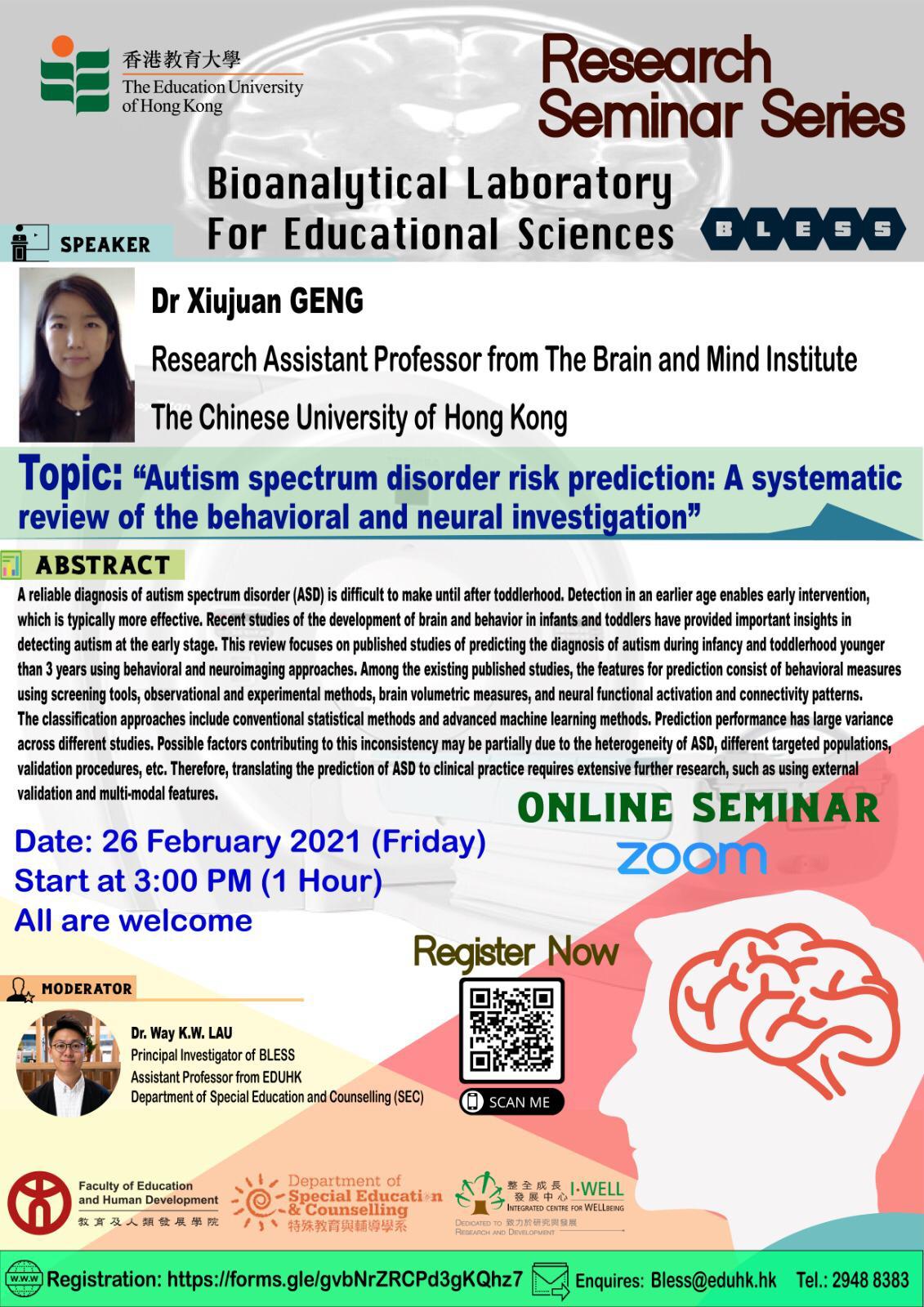
Topic: Autism spectrum disorder risk prediction: A systematic review of the behavioral and neural investigation
Date: 26 February 2021 (Friday)
Time: 3:00 p.m. – 4:00 p.m. (1 hours)
Venue: Online (Zoom)
Language: English
Inquiry: 2948 8383 (Mr. Jackie Chan)
Deadline for enrolment: 24 February 2021 (Wednesday)
Speaker: Dr. Xiujuan GENG from The Brain and Mind Institute, The Chinese University of Hong Kong
Description of the seminar:
A reliable diagnosis of autism spectrum disorder (ASD) is difficult to make until after toddlerhood. Detection at an earlier age enables early intervention, which is typically more effective. Recent studies of the development of the brain and behavior in infants and toddlers have provided important insights in detecting autism at the early stage. This review focuses on published studies of predicting the diagnosis of autism during infancy and toddlerhood younger than 3 years using behavioral and neuroimaging approaches. Among the existing published studies, the features for prediction consist of behavioral measures using screening tools, observational and experimental methods, brain volumetric measures, and neural functional activation and connectivity patterns. The classification approaches include conventional statistical methods and advanced machine learning methods. Prediction performance has a large variance across different studies. Possible factors contributing to this inconsistency may be partially due to the heterogeneity of ASD, different targeted populations, validation procedures, etc. Therefore, translating the prediction of ASD to clinical practice requires extensive further research, such as using external validation and multi-modal features.
Organized by Bioanalytical Laboratory for Educational Sciences (BLESS)
of Integrated Centre for Wellbeing (I-WELL)
Register by clicking the button below if you are interested in joining the research seminar series:
Time: 3:00 p.m. – 4:00 p.m. (1 hours)
Venue: Online (Zoom)
Language: English
Inquiry: 2948 8383 (Mr. Jackie Chan)
Deadline for enrolment: 24 February 2021 (Wednesday)
Speaker: Dr. Xiujuan GENG from The Brain and Mind Institute, The Chinese University of Hong Kong
Description of the seminar:
A reliable diagnosis of autism spectrum disorder (ASD) is difficult to make until after toddlerhood. Detection at an earlier age enables early intervention, which is typically more effective. Recent studies of the development of the brain and behavior in infants and toddlers have provided important insights in detecting autism at the early stage. This review focuses on published studies of predicting the diagnosis of autism during infancy and toddlerhood younger than 3 years using behavioral and neuroimaging approaches. Among the existing published studies, the features for prediction consist of behavioral measures using screening tools, observational and experimental methods, brain volumetric measures, and neural functional activation and connectivity patterns. The classification approaches include conventional statistical methods and advanced machine learning methods. Prediction performance has a large variance across different studies. Possible factors contributing to this inconsistency may be partially due to the heterogeneity of ASD, different targeted populations, validation procedures, etc. Therefore, translating the prediction of ASD to clinical practice requires extensive further research, such as using external validation and multi-modal features.
Organized by Bioanalytical Laboratory for Educational Sciences (BLESS)
of Integrated Centre for Wellbeing (I-WELL)
Register by clicking the button below if you are interested in joining the research seminar series:


